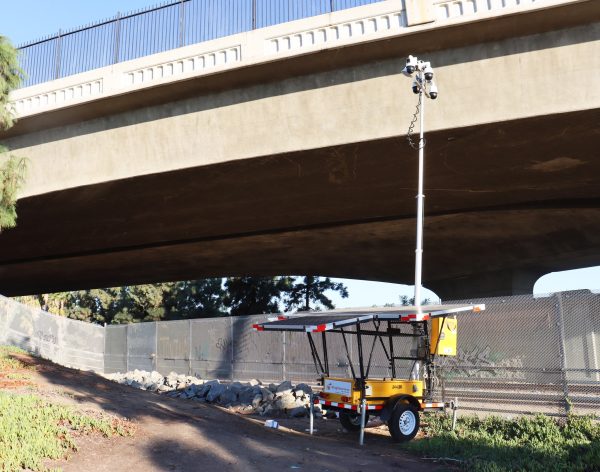New laws in Anaheim took effect last week that restrict homeless encampments and the obstruction of public spaces, illicit sidewalk bicycle chop shops and smoking in parks and other places.
Two new ordinances and an amendment to an existing law took effect Nov. 28 following City Council approval on Oct. 29. The legislative action expands on Anaheim’s existing prohibitions on camping, bike theft and smoking in many specified places.
“The new and expanded ordinances apply to everyone in Anaheim, including those living in homelessness,” according to the city’s announcement of the new laws.
“The changes address life destroying drug use, loss of public spaces and other unsustainable issues at Anaheim parks, bus stops, along streets, freeways and railways and other public spaces,” officials said.
Public spaces
One set of legal changes adds provisions to the Anaheim Municipal Code banning abandoned property on sidewalks and other public areas, as well as lying on or blocking sidewalks, staying in road medians, parkways and other landscaped areas and extended sleeping or lying down on bus benches, park tables and other spaces.
Local lawmakers specified the public spaces covered in the updated code include:
- Walkways
- Curbs
- Bus benches
- Other benches
- Tables
- Playground
- Crossings
- Intersections
- Roads
- Landscaping
- Medians
- Driveways
- Ramps
- Loading docks
- Fire hydrants and other connections
- Businesses
- Buildings
- ATMs
- Charging stations
- Restrooms
- Schools
- Day cares
Prohibited obstructions include:
- Sleeping
- Laying
- Sitting
- Unattended items
- Chairs
- Buckets
- Crates
- Public storing of items
The full text of the ordinance is available on the city’s website.
Bicycles
Another new municipal code chapter addresses bike thefts and sales. “Chop shops,” or makeshift disassembly and sales operations that often take place on sidewalks, have appeared throughout Southern California in recent years.
Officials said about 250 bikes are reported stolen each year in Anaheim with many disassembled for sale as parts.
The new ordinance applies to public spaces and bans assembling, disassembling, selling or distributing multiple bicycles. It also prohibits the possession of disassembled bike frames, bikes with missing parts and multiple bicycle parts.
Specifically, it is now illegal in public to have three or more bikes, inoperable bike frames, two or more bikes with missing parts and five or more bicycle parts.
Public spaces include streets, alleys, parking lots, parks, sidewalks, walkways and roads.
The full ordinance is online.
Smoking
Another municipal code update extends the city’s smoking ban to parks and restrooms and also near bus benches, schools and day care centers.
The amended ordinance prohibits smoking or lighting cigars, cigarettes, pipes, electronic cigarettes or other smoking devices in designated public spaces. Smoking of tobacco, nicotine, cannabis, other plant products or any “combustible substance in any form” is prohibited in designated public spaces.
Officials said the ordinance does not cover smoking in private residences, where that may be allowed in cases involving a landlord or residents’ association.
Public areas covered by the amended ordinance include parks, park bathrooms and areas within 25 feet of schools, day cares and transit stops.
The updated smoking ordinance is also online.
Violations
The new and expanded laws carry misdemeanor or infraction penalties for violations.
Anaheim police and Code Enforcement officers will have discretion to issue citations or make arrests with the objective of gaining voluntary compliance, officials said.
“Officers and the Anaheim city attorney’s office have the option of directing violators to shelter, mental health, substance abuse, housing or other services instead of citation or jail,” according to the city.
“A goal of the laws to address some extreme impacts on parks and other public spaces and to use regulations to encourage those resistant to help to accept assistance in breaking the cycle of homelessness,” officials said.
The Access program, a collaboration between the city and the courts, brings to court social workers and other providers to offer services and case management as an alternative to incarceration, “with accountability and jail time possible if multiple offers of help are declined,” officials said.
Since last year, over 300 individuals have has an Access program assessment, with 145 opting to paticipate in court-supervised plans, according to the city. Twenty-three people have earned case dismissals after graduating from the program.
“Where warranted, those who decline the program’s help can be sentenced to extended jail time or have arrest warrants enforced or issued,” according to the city statement.
The new laws follow several months of city personnel’s increased outreach, enforcement and restoring of public spaces, officials said.
Since September, crews have cleared parks, sidewalks and freeways and installed highly visible surveillance cameras citywide.
“The cameras are a visual deterrent and allow for announcements warning people about being in parks afterhours or of other unpermitted or illegal activity,” officials said.
Along railways, which are among the most hazardous areas for members of the public, city crews have been clearing encampments weekly and working with Union Pacific Railroad to prevent encampments near railroads.
Anaheim’s new laws and efforts to clear encampments follow U.S. Supreme Court’s June decision in Grants Pass v. Johnson, which allows cities and counties the legal standing to enact more aggressive policies on encampment-clearing and other issues related to homelessness.
In July, Gov. Gavin Newsom issued an executive order directing state agencies and local governments to address homeless encampments.







